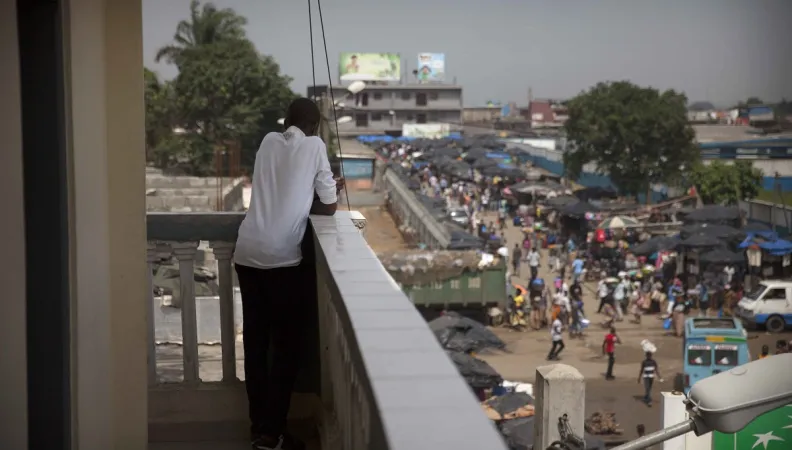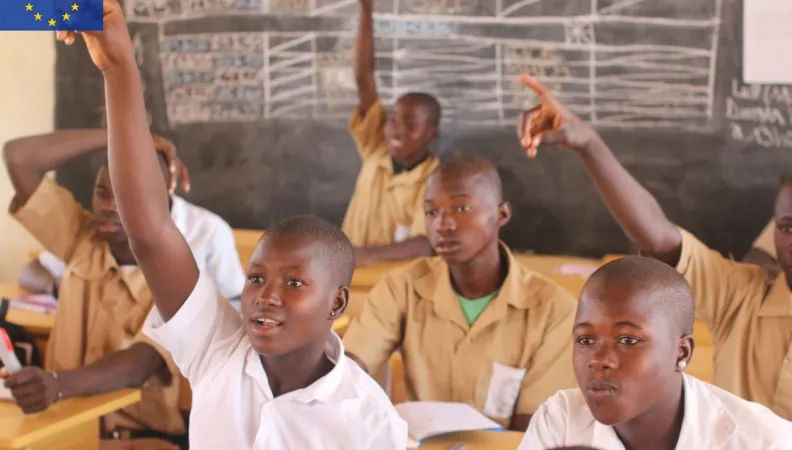Abidjan
Abidjan
Côte d'Ivoire
 Côte d'Ivoire is one of the 60 countries followed by AFD’s country-risk economists, whose assessments shed light on countries' economic trajectory and macroeconomic and financial situation.
Côte d'Ivoire is one of the 60 countries followed by AFD’s country-risk economists, whose assessments shed light on countries' economic trajectory and macroeconomic and financial situation.
Context
Côte d'Ivoire, the leading regional power in West Africa, aims to become an emerging country by 2020. To do this, it must reduce the poverty and inequality affecting its population and take all the necessary steps to promote youth employment. As a long-standing partner of Côte d'Ivoire, AFD supports it in carrying out key transitions for its future: demographic, social, energy, etc.
Goal
Produced by AFD's team of country-risk economists, country assessments provide an analysis of development processes in countries in which AFD operates. They also characterize their growth trajectory, and detect economic, social, political and financial vulnerabilities associated with these trajectories. AFD Group is thus in a position to properly measure the challenges and monitor the risks associated with each of its investments.
Emphasis is placed on developing countries, particularly in Africa, for which macroeconomic analyses are rare or infrequent. AFD seeks to complement existing production on the global economic situation, more focused on advanced economies and major emerging countries.
Find out more: Macroeconomic analyses at AFD
Method
Country-risk analysis is based on a close follow-up over a long period of time and rooted in a fine knowledge of local contexts. Cyclical trends, often highlighted in the news, are always examined in the light of structural trends and of the regional context in which they take place. The aim is to highlight country-specific macroeconomic issues while assessing risks against comparable time- and space-based trajectories.
Country-risk economists place the study of socio-political vulnerabilities, the growth model, the viability of public debt, external balances and the soundness of the financial system at the heart of their assessment, and give specific attention to countries' exposure to climate risks.
Lessons learned
Since emerging from its “lost decade” (2000-2010), Côte d'Ivoire has enjoyed strong economic growth (+7.2% since 2012). Resilient in the face of successive external shocks, it has confirmed its position within the WAEMU. A lower-middle-income country, it aspires to join the upper bracket by 2030. To achieve this, the economy, which is still largely based on commodity exports, faces a number of challenges, including restoring fiscal and external balance. Investment needs remain high to overcome persistent socio-economic fragilities and build an inclusive growth model. Despite good economic performance, the country remains vulnerable to political and security risks.
Our publications on Côte d'Ivoire's macroeconomic situation:
-
"Côte d’Ivoire: Macro-financial resilience and pursuit of an emerging ambition" in MacroDev n°60 (February 2025)
- "Race towards emergence challenged by shocks" in MacroDev Semestrial Panorama n°53 (February 2024)
- "Côte d’Ivoire: a relatively resilient economy", in MacroDev Semestrial Panorama n°36 (September 2021)
- "Debt sustainability in Africa: state of play and future challenges", MacroDev n°34 (May 2021)
- "Les enjeux de la nouvelle croissance ivoirienne" (October 2015, in French)
Contact:
- Laura Marie, country-risk economist at AFD
 Digital technology has gained a major place in development strategies in sub-Saharan Africa. Entrepreneurship as a common is a phenomenon of scale but that is still little known. The study made it possible to map its various forms and analyze the communities mobilized, the underlying economic models and the social issues they address.
Digital technology has gained a major place in development strategies in sub-Saharan Africa. Entrepreneurship as a common is a phenomenon of scale but that is still little known. The study made it possible to map its various forms and analyze the communities mobilized, the underlying economic models and the social issues they address.
Context
As part of its Digital Transition strategy (2021-2025), AFD has made three commitments:
- Offer everyone access to the Internet and its services;
- Put online essential services for each strategic transition;
- Putting the creation of innovative companies at the service of development.
In response, one of the three identified levers is to foster the governance of digital resources in the form of “common”. Digital commons refer to communities of rights holders who create and maintain, on a collaborative basis, databases, computer codes, digital tools, shared knowledge, literary and artistic creations. What we mean by “sub-Saharan African commons” refers to digital resources whose user or contributor communities are located in sub-Saharan Africa.
This research project is part of AFD’s “Commons” research signature programme.
Goal
The aim of the study was to identify the digital commons in sub-Saharan Africa, so as to produce a representative – if not exhaustive – map. The objective was to report on the extent of the phenomenon of digital commons in sub-Saharan Africa, by distinctly analyzing common content, data, software and common hardware shared or open plans and designs. It analysed how digital commons contribute to the achievement of the Sustainable Development Goals (SDGs) and the challenges they face.
The service also analysed in more depth a selection of ten commons (African Storybook; AfricArXiv; AFRINIC; Energypedia; Grassroots Economics; Open MRS; Pamoja-Net; Ushahidi; WaziHub; Wikimedia Côte d'Ivoire), chosen for their representative nature, and proposed avenues for support by AFD.
Finally, the objective of the service was to create a community of interest around these issues through a collaborative approach.
Method
The study was carried out in three phases:
- Collecting digital commons experiences in sub-Saharan Africa through a launch webinar and a collaborative platform;
- Research and census of digital commons at work or mobilized in sub-Saharan Africa through survey work. The research method used was mainly qualitative, through semi-directive interviews with identified African partners: common bearers, contributors, users and facilitators (public actors, private actors). Ten experiments were the subject of more in-depth analyses according to a defined maintenance framework.
- Presentation of research findings.
Results
The study led to three main results:
- Production of an illustrated mapping and a proposal for taxonomy of digital commons in sub-Saharan Africa, following a literature search, workshops and interviews. It identifies 89 examples of digital commons with communities in sub-Saharan Africa. This collaborative mapping is available online (in French).
- Construction of a community (researchers, practitioners of the commons, institutional) interested in this subject, through the establishment of a collaborative approach.
- Analysis of illustrative cases of issues related to commons and opportunities for AFD to support them. These analyses gave rise to ten descriptive sheets of these commons.
Find out more about digital commons in Africa in the dedicated chapter of The Commons. Drivers of change and opportunities for Africa.
Lessons learned
Five working hypotheses have been formulated:
- Hypothesis 1: African communities are very diverse and rarely identify themselves as commons.
- Hypothesis 2: Sub-Saharan African communities that participate in the development of commons are based first of all on a few committed citizens.
- Hypothesis 3: The sustainability of the identified commons depends heavily on their ability to mobilize international support.
- Hypothesis 4: The positive impact of access to global digital commons in sub-Saharan Africa is increasingly recognised.
- Hypothesis 5: The digital commons of sub-Saharan Africa participate in citizen struggles to decolonize knowledge and culture and support the local creation of value.
Read also: Digital Commons and Entrepreneurship: Alternative or Complementary Approaches?
Contacts:
- Stéphanie Leyronas, research officer at AFD
- Jan Krewer, independent consultant
 Legal notice EU (project) While the Ivorian economy is experiencing a definite upturn, there is hardly any decline in the level of poverty and inequalities. This research program has been included in the Strategic Dialog Memorandum between the Ministry of Planning and Development and AFD, to look for ways and mechanisms that may help lower the level of inequalities. Its aim is to take stock of the inequalities in Côte d'Ivoire and especially to examine the impacts of shocks, access to basic services, and public policies.
Legal notice EU (project) While the Ivorian economy is experiencing a definite upturn, there is hardly any decline in the level of poverty and inequalities. This research program has been included in the Strategic Dialog Memorandum between the Ministry of Planning and Development and AFD, to look for ways and mechanisms that may help lower the level of inequalities. Its aim is to take stock of the inequalities in Côte d'Ivoire and especially to examine the impacts of shocks, access to basic services, and public policies.
Context
An upturn in growth in Côte d'Ivoire since 2012 has been observed, with average growth rates in real GDP surpassing 8%. However, this renewed vitality in the economy has not yet been felt by all of Ivorian society. The level of poverty remains high (46.3%), as does that of inequalities. (The Gini index for 2015 is estimated at 0.402 by the National Statistics Institute and 0.415 by the World Bank). We can thus see that, while the Ivorian economy seems to be doing well, a very large proportion of its population is excluded from the benefits of this economic upturn.
This project is part of the first phase of the Research Facility on Inequalities, coordinated by AFD and funded by the European Commission's Directorate-General for International Partnerships over the 2017-2020 period. The first phase of the Facility has led to the conduct of 22 research projects and the publication of around 100 research papers and policy briefs.
Goal
This research program on inequalities in Côte d’Ivoire will first take stock of the inequalities there, and then it will carry out scientific studies on three themes:
- the impact of shocks on inequalities;
- the inequalities of access to education and to quality health services;
- the impacts of public policies on inequalities.
The study will also focus on the perception of inequalities by Ivorians.
Method
The research on inequalities will take stock of the Ivorian situation and will review the initiatives of public authorities to fight monetary and non-monetary inequalities. Using the data available on the living conditions of the households, the main indicators for the measurement of inequalities will be calculated and a representation of the spatial distribution of the inequalities will be carried out in the form of maps. Subsequently, an analysis will be carried out on inequalities in opportunities (measured by the effect on opportunities from parents’ education, their occupation, place of birth, and gender) with regard to access to property and assets, as well as on the sources and the perceptions of these inequalities.
The study on the shocks will be based on statistical analysis and modeling methods (in particular, a linear regression model and a panel data model will be applied). Access to basic services will be covered mainly with the help of micro-econometric models. The study of the effects of public policies will be considered with a microsimulated inter-industry model, then by impact evaluation models.
Results
The project is expected to produce a review describing the state of public interventions designed to eradicate inequalities in Côte d'Ivoire. The study on the perception of inequalities will also make it possible to measure the extent to which households are conscious of the need for greater social justice and identify possible measures at the individual level. This research will also help identify the mechanisms of intergenerational transmission of inequalities and will propose policy measures for social mobility in Côte d'Ivoire.
This research will give rise to conferences and workshops. Various publications are also expected: a report, policy briefs, and research articles.
You may find the report and the research papers linked to this project here (in French) :
- Etat des lieux des inégalités en Côte d'Ivoire
- D'où proviennent les inégalités en Côte d'Ivoire?
- Analyse de l'impact de la crise de 2002 sur les inégalités en Côte d'Ivoire
- Impacts des dépenses publiques sur les inégalités en Côte d'Ivoire: le cas des secteurs sociaux
You may find the policy briefs linked to this projet here (in French) :
